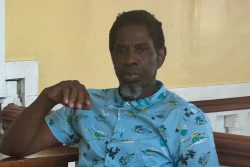As the New Year dawns with West Indies cricket fortunes continuing the same old gloomy, we are seeing yet another series of calls for major surgery on the organization in charge of our cricket. Esteemed cricket pundits in the Caribbean, including Tony Cozier and Michael Holding, are calling for the West Indies Cricket Board to be overhauled and to be made accountable. In recent months, the current President, Dave Cameron of Jamaica, has come in for severe criticism, peaking with the recent furor when our regional team cancelled an Indian tour, leading to the writer Andre Baptiste in the Trinidad Guardian stating “While not for the first time, a sitting West Indies Cricket Board (WICB) president finds himself in the firing line, and Cameron seems heading to be top of the list as the “worst WICB President in history.’” We are even seeing radical suggestions as from Jamaica Gleaner guest columnist Paul Wright, who reacted strongly to our continuing wretched performances by proposing: “What is needed in the West Indies is for us to understand and realise that as a Test-playing nation, we are a joke. Let us be brave and request from the International Cricket Council (ICC) a five-year leave of absence from Test cricket. Say thanks to this present crop of ‘senior’ cricketers and concentrate on under-15 youngsters. With proper guidance re technique, nutrition, and education, we will produce technically gifted young men with the ability to think. Then, and only then, should we re-enter the Test cricket arena.”
Most of the commentary, however, is focusing on the removal or restructuring of the present WICB with, tellingly, many of them emanating from respected cricket voices in Jamaica, such as Michael Holding and Tony Becca, calling for Jamaican President Cameron to step down. Indeed, the anti-President tirade has a long history going back to the days of former Board boss Pat Rousseau, himself a Jamaican, and continuing through the years. It was there in Ken Gordon’s time as President, as with his successor Julian Hunte, and, subsequently, Dave Cameron, and it suggests that perhaps the problem with the WICB is not so much the organization’s head – we have found fault with every one of them, even the revered Wes Hall of Barbados – but in the organization itself. Changing the head of a dysfunctional organization does not remedy the dysfunction; a radical overhaul is needed, such as the one suggested by the Patterson Report for restructuring of our cricket, commissioned by the WICB, but not adopted by that body.
 The calls for this restructuring have been made repeatedly, and as we ponder why the change has not come, we should note that while the West Indies takes the cricket field against other nations, the West Indies, while playing as a unit, is actually a team made up of players from several different countries. This unique arrangement – the only one of its kind in sport – has historically been the source of contention with the various participating groups (Jamaica, Trinidad, Barbados, Guyana, Leeward Islands, Windward Islands) each inevitably pursuing their own agendas in their dealings with the WICB. The existence of this insularity is the elephant in the room, and apart from a recent comment from Michael Holding, it is not a topic we seem inclined to confront.
The calls for this restructuring have been made repeatedly, and as we ponder why the change has not come, we should note that while the West Indies takes the cricket field against other nations, the West Indies, while playing as a unit, is actually a team made up of players from several different countries. This unique arrangement – the only one of its kind in sport – has historically been the source of contention with the various participating groups (Jamaica, Trinidad, Barbados, Guyana, Leeward Islands, Windward Islands) each inevitably pursuing their own agendas in their dealings with the WICB. The existence of this insularity is the elephant in the room, and apart from a recent comment from Michael Holding, it is not a topic we seem inclined to confront.
Similarly, although the “time for change” comment is frequently made – these days, almost weekly somewhere – it produces no action and we continue soldiering along from one crisis to another. Even when the Grenadian politician Keith Mitchell stepped out with concrete proposals, we could see the insularity nerve in play when he was immediately criticized by Barbadian leader Owen Arthur for being presumptuous.
Indeed, given our awareness of the very provincial attitudes across the Caribbean that get in the way of all our regional efforts, what makes us believe that cricket is exempt from this problem? The fact that we have been talking about WICB change for over 20 years and nothing has happened suggests that the political winds that act throughout the Caribbean are also blowing in our cricket. For devotees of the game, in this day of instantaneous and easy communication, information of the workings of the WICB remain scant, and successive presidents have either seen no need to be more transparent, or have been so persuaded by the WICB members themselves, or by others. The WICB has a constitution which, as with all constitutions, is supposed to govern all that they do. I haven’t seen it, but former President Pat Rousseau has recently commented publicly that “No one, whether the President, Vice-President, the CEO, the Selectors or the Board Members, either individually or collectively, has the power to exercise any disciplinary action against the players and are obliged to use the process prescribed in the Constitution, of referring all matters of player discipline to the Disciplinary Committee appointed by the Board. This process has long existed and is designed to protect the players from any arbitrary action against them for perceived breaches.” He was referring to recent accusations that the striking players involved in the recent India cancellation would be disciplined or victimized.
Ultimately, one has to recognize that there is an administration problem in our cricket, but given that no substantive change proposal has come forward from any source, it appears that we will likely continue hobbling along with the present arrangement. Respected writers and former West Indies players can complain all they want. Change will come only when some pivotal figure in the Caribbean takes on the battle. That’s one reality. The other reality is that we have a peculiar creature here in this multi-national cricket team operating under the name West Indies that militates against that figure finding any traction for his/her efforts. Purely from a business perspective, our failure to run the sport probably owes more to that conundrum rather than anything else.









